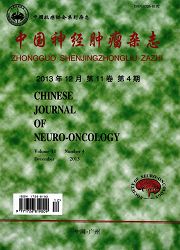

 中文摘要:
中文摘要:
转化生长因子-β(transforminggrowthfactor-β,TGF-β)作为一种多功能生长因子,具有抑制神经干细胞增殖以及诱导其分化的功能。然而,TGF-β在肿瘤形成过程中具有双重性,在肿瘤形成初期TGF-β可作为抑癌因子抑制细胞增殖.促进细胞分化或凋亡:而在肿瘤发展期,TGF-β却通过促进肿瘤增殖、刺激血管增生和抑制免疫反应而成为促癌因子。目前TGF-β由抑癌因子转变成促癌因子的分子机制尚不清楚。研究发现,TGF-β信号通路在高级别胶质瘤中高度激活表达,并且TGF-β活性高的胶质瘤患者的临床预后极差。胶质瘤干/祖细胞作为胶质瘤发生发展的起源.是胶质瘤治疗成败的关键。因此,研究TGF-β信号通路在胶质瘤干/祖细胞中的生物学效应显得至关重要。本文就TGF-β信号通路在肿瘤干细胞和胶质瘤干/祖细胞的增殖、分化、血管生成、转移等方面的作用作一综述.
 英文摘要:
英文摘要:
Transforming growth factor β (TGF-β) acting as multifunctional growth factor can inhibit proliferation and induce the differentiation of neural stem cells. However, TGF-β has dual function in the process of tumor formation. TGF-β can be used as tumor suppressor inhibiting cell proliferation, promoting cell differentiation and apoptosis at the early stages of tumor development. While in the stages of tumor progression, TGF-β becomes oncogenic factor stimulating angiogenesis and suppressing the immunoreaction. Although TGF-β signal pathway has been extensively studied, the molecular mechanisms that trigger TGF-β to switch on the transition from tumor- inhibition to tumor-promotion are still not well understood. Recent research suggests that TGF-β signaling is highly active in high grade gliomas and the elevated TGF-~ activity has been associated with poor clinical outcome in this deadly disease. Glioma stem/progenitor cells as the origin of glioma in development, is the key to a successful glioma treatment. Therefore, it is crucial to study TGF-β signaling pathways in glioma stem/progenitor cells (GSPC). This review summarized the biological effort of the TGF-β signaling pathways in the cancer stem cells and Glioma Stem/ Progenitor Cells including proliferation, differentiation, angiogenesis, and metastasis.
 同期刊论文项目
同期刊论文项目
 同项目期刊论文
同项目期刊论文
 RGD Modification Improves the Transfection Efficiency of Adenovirus Vectors Carrying Double Objectiv
RGD Modification Improves the Transfection Efficiency of Adenovirus Vectors Carrying Double Objectiv Transcriptional expression of glioma chemotherapy drugs associated marker molecules in gliomas and n
Transcriptional expression of glioma chemotherapy drugs associated marker molecules in gliomas and n 期刊信息
期刊信息
